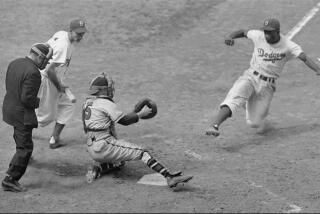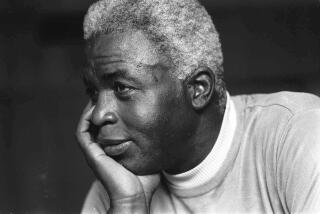Just When Does a Slump Become a Way of Life?
- Share via
Some things the slumping Cal Ripken definitely does not need:
More milk.
Another new batting stance.
Cab money.
A day off.
He probably doesn’t think he needs any advice, either, although your typical talk-show caller might disagree. Of course, your typical talk-show caller not only thinks he can solve Ripken’s batting problems, but also has some advice for NASA on the telescope-cable snafu.
I don’t know if Ripken needs advice. Frank Robinson thought a little sit-down might help, so manager and star talked for 20 minutes Tuesday afternoon behind a closed door, after which the manager pronounced it a good meeting and the star didn’t say anything at all. Cal Ripken does not like to talk about hitting -- or meetings about hitting -- when he isn’t doing much of it. That must be why he hid in the players’ room, with his sumptuous postgame meal of ham and potatoes, for at least 45 minutes after Tuesday night’s game. Bon appetit.
What is wrong with Ripken? The only one around Memorial Stadium in a bigger slump is Wee Willie in the crab race (the worst nightly stadium event, by the way, since John Denver used to sing “Thank God I’m a Country Boy”). There are many theories, no answers. Robinson likes to trot out the one about the star trying to take too much of the load for a slumping team. In other words, he isn’t relaxed enough.
Another theory is that, with a slumping Mickey Tettleton batting behind him most nights, Ripken doesn’t get any good pitches to hit. In other words, he isn’t patient enough.
The most popular theory involves the business of the streak, a monster now out of control. Ripken has to play every day, tired or not, focused or not, awake or not. How can he quit? The streak, now at 1,271 games, defines him. It also has nothing to do with his batting average. Come on, it’s the second day of May. If a player is tired this time of the season, he’d have to check into a rest home by August.
Pete Rose, whom you may remember, had two long consecutive-game streaks. And he didn’t just play baseball. Rose went to the track during the day, chased women at night and ran to first on walks during the games. And he still managed to hit .300 every year.
The problem isn’t that Ripken plays too often. The problem is that he isn’t hitting safely often enough, a condition many players, particularly on the Orioles, share. The Orioles are hitting .185 on this home stand. Ripken is hitting .184. Is the whole team tired?
This is not a new circumstance, either. Ripken’s numbers have steadily declined since 1983, his MVP season, when he set a standard he has never been able to match. And since mid-season of last year, in what was a magical year for everyone else, Ripken has been, well, ordinary. People start talking about what a great defensive player he is when they want to say something nice about him.
In his last three seasons, he has hit .252, .264 and .257, respectively. He hasn’t hit .300 since 1984, and he hasn’t driven in 100 runs since 1985. Since July of last season, he is hitting .233. When does a slump translate into a way of life?
But let’s take the worst-case scenario. Let’s say the kind of year he had last season is all you can expect from him anymore. He drove in 93 runs last year. He hit more than 20 homers for the eighth consecutive season last year. He played the shortstop of his life last year. Even during his worst slump, the one of last September, Ripken still led the team in RBI with 15. A Cal Ripken who doesn’t live up to expectations is still the Orioles’ best player.
But he isn’t all the Orioles have. He can’t be, or the Orioles are in even worse shape than they appear to be right now.
“This is no longer just a Cal Ripken team,” hitting coach Tom McCraw was saying Tuesday night. “Last year, you could see how Cal might think that way. (Randy) Milligan and (Craig) Worthington and (Mike) Devereaux were untested. Now, we know Worthington can drive in runs. We know Milligan can hit. It’s up to those guys, and to Mickey (Tettleton) to do their share, too. It’s not just Cal.”
It’s not just Cal. A year ago, as September began and the pennant race heated up, Robinson talked about looking to Ripken as the player who had to lead them. He hit .198. Maybe he tried too hard. That’s easy to believe with Ripken, who, you know, tries as hard as anyone in baseball. Whatever his problems, they have nothing to do with lack of effort. He’s the original extra-batting-practice guy who, when he’s finished, takes a couple hundred ground balls.
Tuesday night, he walked twice (he was patient). Breaking an 0-for-12 streak, he hit a single to right (he used the whole field). And he popped weakly to first (his seventh weak pop to first in the past eight games).
The meeting didn’t seem to do much, but Frank Robinson never suggested it would have immediate results. Robinson talked to Mickey Tettleton two weeks ago, and Tettleton, before an impacted wisdom tooth removed him from the lineup, is one for his last 16 with eight strikeouts in his last 12 at-bats.
And yet, the Orioles’ slump will end. “We have one every year,” Robinson says. “People forget every year how bad it was.” Ripken’s slump will end, too. The question on Ripken, and on the team, is how good they will be when they do start hitting. Will the Orioles be good enough? And will Ripken, who is only 30, ever approximate what he once was?
More to Read
Go beyond the scoreboard
Get the latest on L.A.'s teams in the daily Sports Report newsletter.
You may occasionally receive promotional content from the Los Angeles Times.










